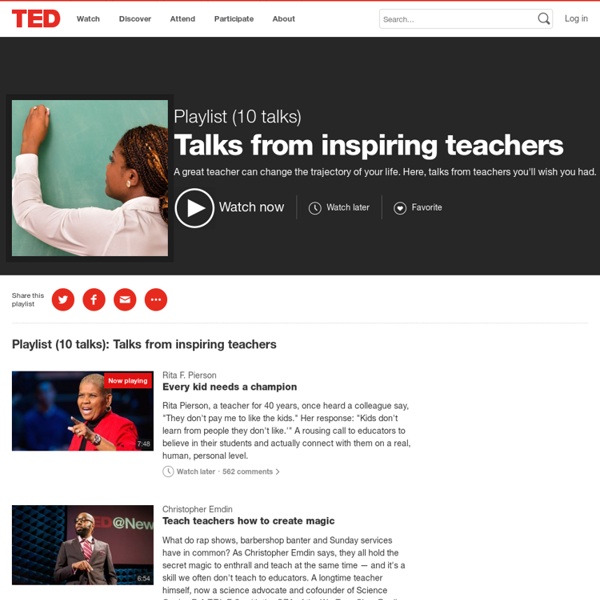



http://www.ted.com/playlists/182/talks_from_inspiring_teachers
Related: Odds and sods • Raising KidsWhat the best education systems are doing right In South Korea and Finland, it’s not about finding the “right” school. Fifty years ago, both South Korea and Finland had terrible education systems. Finland was at risk of becoming the economic stepchild of Europe. The 8 Secrets of Dutch Kids, the Happiest Kids in the World - Finding Dutchland According to Unicef’s most recent Child Well Being in Rich Countries survey, Dutch kids ranked as the happiest kids in the world. Dutch kids led the way in three out of the five categories, namely- material well being, educational well being, and behavior and risks. Unicef Germany isn’t the first research organization to come to this conclusion. Surveys conducted by Britain’s Child Poverty Action Group, the World Health Organization, and Unicef International have all reached unanimous conclusions as to the happy state of Dutch children. Why exactly are Dutch kids the happiest in the world?
Look-ahead 2015: Fly into the future and other predictions 2 January 2015Last updated at 10:12 ET By Fiona Graham Technology of business reporter, BBC News This is a not uncommon reaction to reading the Technology of business predictions for the coming year The tree might still be up, but I wouldn't advocate finishing off the last of the turkey unless you're keen to have a good reason to call in sick on Monday. The Trouble With Bright Girls Successful women know only too well that in any male-dominated profession, we often find ourselves at a distinct disadvantage. We are routinely underestimated, underutilized, and even underpaid. Studies show that women need to perform at extraordinarily high levels, just to appear moderately competent compared to our male coworkers. But in my experience, smart and talented women rarely realize that one of the toughest hurdles they'll have to overcome to be successful lies within. We judge our own abilities not only more harshly, but fundamentally differently, than men do. Understanding why we do it is the first step to righting a terrible wrong.
Scientists Build A Supercomputer From PlayStations To Study Black Holes Government funding for research is becoming increasingly difficult to come by due to ongoing global economic instability, which is why many scientists are forced to look elsewhere to keep their research projects alive. Some are turning to crowdfunding, which is now allowing the UK to explore the moon, whereas others are practicing being thrifty. Dr. Gaurav Khanna is a perfect example of the latter, as he has managed to make an extremely cheap supercomputer using PlayStation 3 (PS3) games consoles.
Raising a Moral Child Photo What does it take to be a good parent? We know some of the tricks for teaching kids to become high achievers. For example, research suggests that when parents praise effort rather than ability, children develop a stronger work ethic and become more motivated. Stunning, psychedelic images where art and science collide In his TEDGlobal 2013 talk, Fabian Oefner shares breathtaking images at the nexus of art and science, which beautifully capture unique moments of physical and chemical drama. Formally trained in art and design, Oefner says that he has always been interested in science. Though he can’t pinpoint the exact moment when he became interested in pairing his two loves, he views both pursuits as inextricably linked by a crucial bond: “The most important quality of science or art is curiosity,” Oefner tells TED.
10 Common Mistakes Parents Today Make (Me Included) When I became a mom, I got lots of advice on how to love my child. But not until a few years ago did someone actually point out that loving a child means wanting what's best for them long-term. When my four daughters were young, long-term didn't resonate with me. Back then it was about survival, meeting daily needs and keeping my head above water. How to Study Abroad in Europe Without Breaking The Bank by Robert Montenegro Studying abroad is awesome. Anyone who has the opportunity to do so yet opts not to is really missing out. I personally believe immersing yourself in another culture makes you a better, more empathetic person. It's the whole "seeing the world through other people's eyes" thing. The whole experience is also loads of fun and, depending on how you play your cards, a relatively affordable way to see parts of the world you'd otherwise not be able to visit.
The Rules Making sense of race and privilege By Lawrence Otis Graham ’83 Published in the October 8, 2014, issue Michael Falco/Black Star Lawrence Otis Graham ’83 Something surprising happens to your body when you freedive Featured image: Photo of freediver Hanli Prinsloo by Annelie Pompe. In 1949, a stocky Italian air force lieutenant named Raimondo Bucher decided to try a potentially deadly stunt off the coast of Capri, Italy. Bucher would sail out to the center of the lake, take a breath and hold it, and free-dive down one hundred feet to the bottom.